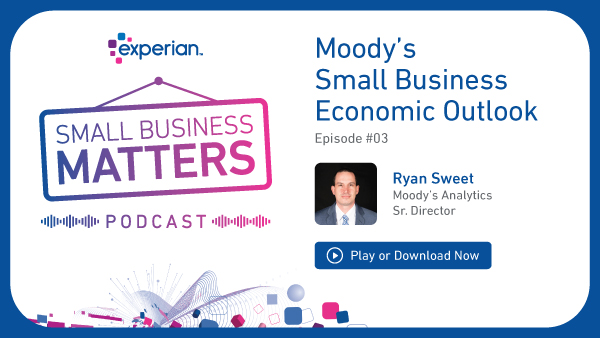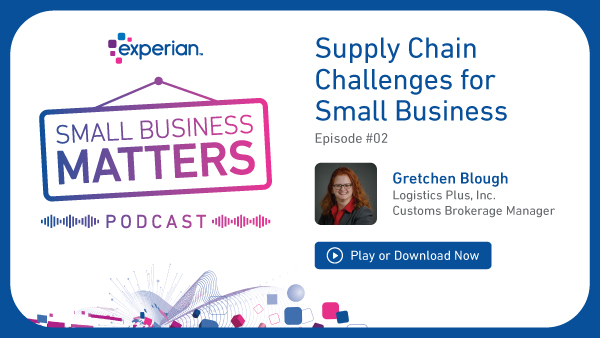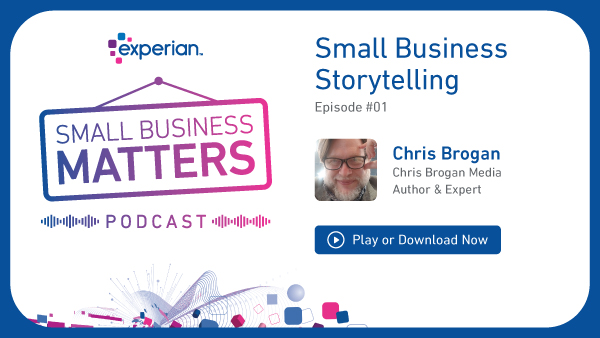All posts by Gary Stockton

Ryan Sweet from Moody's Analytics joins us on the Small Business Matters podcast to offer a small business economic outlook for the new year.

The legacy of Martin Luther King, Jr. is one that has spanned generations and continues to inspire people around the world. The hope he brought with his message of non-violence was a catalyst for change for millions of people, including many of us who work at Experian. We are honored to share what Dr. King's legacy means in our own lives and how we plan to carry his message of courage, strength, and determination into the future. "Love is the Greatest Force in the Universe" "What inspires me about Dr. Martin Luther King, Jr. is the way he was always able to show love, no matter what he was going through," says Chris, VP of Sales at Experian. "Despite threats, despite social injustices, despite assassination attempts on his life--he didn't grab a gun. He didn't teach hate. He taught love. Just like Dr. King, I teach and tell others that no matter what you're going through, or how hard it gets, just show love--genuine love--and it will always work out." His Message of Nonviolent Resistance Gary, Senior Manager, BIS, says the thing that inspires him the most about Dr. Martin Luther King, Jr. was his message about nonviolent resistance, and how it can bring about social change. "A simple but powerful act of boycotting public buses en masse brought about the November 1956 ruling by the Supreme Court that segregation on public buses was unconstitutional," he says. Today I celebrate the life, legacy and message of Dr. Martin Luther King, Jr." "I Can Do Small Things in a Great Way" "His work taught me never to give up hope in the face of despair," says Corliss, Senior Manager, Financial Inclusion, DEI Marketing. "As he said, 'We must accept finite disappointment, but never lose infinite hope.' Dr. King also taught me that we have a role to play to make a difference in this world, and that ordinary people can do extraordinary things. He said, 'If I cannot do great things, I can do small things in a great way.' So thank you, Dr. King, for your legacy of hope, love and reminding us again, that ordinary people can do extraordinary things." "I Have a Dream" Bryan, Social Media Specialist, says King's iconic "I have a Dream" speech has been a huge inspiration for him. "That speech…taught me that if you believe in something, stand up for it. It taught me to be the change that I want to see in the world," he says. "I'm proud and honored to continue his legacy. So, Dr. Martin Luther King, Jr.--you had the dream, and now it's my job to make sure your dream becomes reality." "Dangerous Unselfishness" "I believe it is MY responsibility every day, to use my privilege to ensure Martin Luther King Junior's dream is not buried," says Emily from Business Information Services. "To amplify the voices of people of color who are still not being heard because white people will not stop talking. Today, I will listen, I will learn, and I will practice 'dangerous unselfishness.'" Together, We Make the World a Better Place Taneishia, Account Executive, Software Sales, says that hearing Dr. King's "I Have a Dream" speech as a child encouraged her to dream, to hope, and to believe in something bigger than herself. "His work and his impact is evident in the fact that I, a woman of color, a Black woman, have the opportunity to work for a company like Experian alongside people of all types of ethnicities and backgrounds," she says. "Coming together, we are making Experian and the world a better place." Taking the First Step, Even When You Can’t See the Entire Staircase “When reflecting on the memory of the late, great Dr. Martin Luther King, Jr., there are so many things that I'm struck by,” says Jennifer, Senior Manager, Marketing. “His grace, his humility, and his ability to triumph in the face of adversity. One of the things that he said is that faith is taking the first step, even when you can't see the entire staircase. This resonates with me, because it shows that in times of difficulty and uncertainty, you just have to keep moving forward, taking the first step. Even though you don't know what the end result will be.” “We have an opportunity to make America a better nation.” We are grateful to Dr. King for his tireless efforts towards equality for all people, for his vision of the future that he would hold, but never see. Today we at Experian join people all over the world as we honor his memory, his work and his legacy. "Let us rise up tonight with a greater readiness. Let us stand with a greater determination. And let us move on in these powerful days, these days of challenge to make America what it ought to be. We have an opportunity to make America a better nation."1 Footnotes: 1. From the "Mountaintop Speech," King's last speech on the eve of his assassination, April 3, 1968

You’ve heard it a thousand times: location, location, location. And sure, if you run a brick-and-mortar small business, details like great traffic and excellent parking certainly improve your possibilities. But regardless of your location, I thought maybe we could talk a moment about “place” and what it means to be a small business rolling into these next years. The Importance of Place for Small Businesses Ever since the COVID-19 Pandemic began in 2020, people everywhere have had to reconsider their relationships with local businesses. It used to just be a sign you’d see in the window: “shop local.” But with lockdowns, unemployment, shipping and logistics delays, and so much more to contend with, people everywhere found themselves having to think about who they wanted to spend their money with and what that meant to them. Before 2020, people might not have thought twice about placing their order with a large online retailer or a global big box store. But as the Pandemic continued, many communities rallied around supporting local businesses like never before. It suddenly became quite clear that without some direct and thoughtful local intervention, some of these small businesses might not make it for more than a few months, and some doors might be shutting forever. What could a small business do? Well, lots, as it turns out. Sean Hopkins opened “Hoppy’s Cantina” in a small northern Massachusetts town a few days before the entire state’s first big virus-related lockdown. He’d run restaurants before--this kind of delay might end up being a kiss of death before he’d even had a chance to fail in all the typical ways. He started posting little videos on Facebook about the kinds of burritos you could pick up via Take Out ONLY. Of course, just a few items were available, but Sean’s Facebook videos sold the heck out of them. His guacamole videos (often complete with singing) made your mouth water, not to mention the incredible pulled pork burritos. Sean’s efforts on his Facebook page drove sales that kept his restaurant alive during lockdown for sure. Local is More of a Badge Than Ever Before It’s a great time to promote your local roots, and people are showing interest in keeping their neighborhood businesses alive. It’s one thing to worry about who has the right price. It’s another to know that a company might vanish, thus leaving people with no local choice, if something isn’t done to keep it that way. All that glitters is not gold, after all. But one caution: there’s not a lot of forgiveness for poor customer service. You might not be able to compete on price, but if you don’t make the buying experience professional, friendly, and very efficient, you might not be able to count on that local support for long. One last detail: share the wealth. Just as you might run a local business, also remember to visit some local restaurants, buy from a few local shops, and refer as much business as possible to your neighbors. It’s most definitely a group effort, and the more people sharing the work, the easier it is to keep more local companies safe. What have you done to make “local” matter even more? About the Author In addition to being a best-selling author and influencer in the marketing space, Chris is a sought-after keynote speaker and showrunner of “The Backpack Show.” Currently, Chris serves as Chief of Staff at AppFire, providing strategic advisory services to the senior and executive leadership of the company, with a mandate to drive the company’s major initiatives across the organization. He is also President of Chris Brogan Media, offering brand and digital content strategy and business strategy advisory services. Related content Small Business Storytelling with Chris Brogan

Small business owners may have a small business credit card or even use their personal credit card when they’re just getting started. However, as a business grows, new types of financing that don’t depend on the owner’s personal finances—such as corporate credit cards—may become available. The Difference Between Corporate and Small Business Cards Corporate and small business credit cards can offer a variety of benefits. One of the main reasons companies sign up for a credit card is to empower employees to make purchases on the company’s behalf by using the company card. Using these cards, employees won’t have to pay out of pocket and wait to be reimbursed later. And employers may be able to limit where employees can use the card and how much they can spend, giving them greater control over their business finances. There are some similarities between corporate and small business cards, but they’re not created for the same types of companies. While small business credit cards may be available to any business, corporate cards are primarily intended for large and established businesses. What Is a Corporate Credit Card? Corporate credit cards—also known as commercial credit cards—are credit cards for medium- and large-sized businesses, although there are also some corporate card programs for startups. To qualify, a company must be either registered or incorporated—for example, as a limited liability company (LLC) or an S or C corporation. Card issuers may look at different factors when reviewing a card application, such as the business’s revenue, number of employees, history with the issuer and investors. In some cases, a business may need several hundred thousand (or several million) dollars in revenue to qualify. You may be subject to a credit check before getting a company card, but it won’t be reported to the credit bureaus under your name or impact your personal credit. Instead, the card’s usage and payment history is added to the company’s business credit report. Corporate cards also often don’t require a personal guarantee, meaning cardholders aren’t personally responsible for the debt. Unlike many small business cards, corporate cards are often charge cards rather than credit cards—meaning the company must pay the full balance at the end of each billing period. But similarly to personal and small business cards, some corporate cards offer rewards and have annual fees. Rewards aren’t the only—or even the most important—benefit, however. Companies can request employee cards to easily authorize and track employees’ expenses, eliminating the need for reimbursement requests. Corporate cards may also offer in-depth analytics and integrate with accounting platforms, which can help businesses save time, money and paperwork. What Is a Small Business Credit Card? Small business credit cards are typically more similar to consumer credit cards than corporate credit cards. Some consumer and small business cards even have similar names, fees and rewards programs. And, as with consumer cards, small business credit cards may let you revolve a balance and charge you interest on the unpaid amount. Unlike a corporate credit card, getting approved for a small business credit card can partially depend on the owner’s creditworthiness. If you apply for a small business card, the application might lead to a hard inquiry on your personal credit report. A card issuer may even report the card to the credit bureaus under your name, meaning it can impact your credit—although some only do this if the business misses payments. Small business cards also generally require a personal guarantee. As a result, if the business can’t afford the payments, you could be personally liable for the card’s unpaid balance. However, a small business card can help you keep your personal and business finances separate. The cards may also offer business-specific perks, such as free employee cards and bonus rewards on common business purchases. And, as the primary cardholder, you may be able to set limits on employee cards and determine how you want to use the rewards. Which Credit Card Is Best for Your Business? Most small business owners, entrepreneurs, solopreneurs and contractors will only be eligible for small business credit cards. However, if you work for or run a medium- to large-sized business or a venture-backed startup, a corporate credit card may be a better option. While you could open a small business credit card, a corporate card might give you a higher spending limit, more control over employees’ cards and better analytics and reporting. The ability to finance your business’s operations without being personally liable for the debt can also be a major benefit. Be Sure to Monitor Your Company’s Credit If you run a business and want to open a business or corporate credit card, your business credit score could be an important factor. Additionally, some small business lenders require a personal credit check before they’ll offer you a business loan, line of credit, invoice factoring or other types of financing. You can check and monitor your Experian business credit report, and get insights into how you can improve your company’s credit scores. About the author Louis DeNicola is freelance personal finance and credit writer who works with Fortune 500 financial services firms, FinTech startups, and non-profits to teach people about money and credit. His clients include BlueVine, Discover, LendingTree, Money Management International, U.S News and Wirecutter. Louis lives in beautiful Oakland, California, where he enjoys indoor rock climbing, yoga, and volunteers as a tax preparer.

Small businesses are feeling the impact of supply chain challenges in the form of port slowdowns. We talk to an expert about the situation.

Why it is so important to separate business and personal credit When we look at small business owners like you in the U.S., we know that you are less delinquent on your accounts. You revolve a little bit more of those balances as you go forward, as you're trying to grow your business. And we know that you are more likely to pay your debt because it's tied to your livelihood. And if something is tied to your livelihood, you're more likely to honor it. Well, we want you to honor all your obligations on your consumer and commercial credit. And so to do that, it's better to separate out those two forms of credit. Your two profiles, your business, and your consumer, meaning just your personal credit. So when we look at this, think about it in this way. I have a small business, and with my small business, sometimes I need to buy equipment. But it as a small business owner. I may not have established my commercial credit. I don't have anything on a commercial credit card. I don't have an installment loan through my business. And I want to do it on my consumer credit card. So I go out and I buy this piece of equipment. I put it on my consumer credit card. What that does is add debt to my consumer credit. A lot of times that utilization will be a little bit higher. The debt will be higher. It's a piece of equipment. Generally, it's pretty big. That means my score will go down a little bit. You may come into a life event. So we've had a third kid and my wife says, hey, we need a little bit bigger house. So to do that, we go shopping for a house. But what I have is this piece of equipment on my personal credit, bringing my score down a little bit. That's going to make the cost of my house a little bit higher. And I may not be able to afford the houses that I'd really like. So pulling that piece of equipment, going through a commercial credit facility, getting it on a commercial credit card or an installment loan through my business will bring that debt off of my personal credit and put it under my business, where it should be. That establishes my small business, allows that score on my small business to go up. It also takes a debt load off of my consumer credit, allows that to go up. And so it makes me have a better opportunity to buy a house at a cheaper price, also allows me to build my small business credit. And in doing that, I can gain access to cheaper funds for my business going forward and grow. You can check your Experian business credit score by purchasing a one-time copy of your credit report or by signing up for business credit monitoring, including unlimited access to scores. Read our post on checking your business credit score for more information. Related: What is a good business credit score? How do I check my business credit score? Adding tradelines to build credit for your business

Small business expert Chris Brogan on telling compelling stories for your small business and why storytelling is a vital component of your strategy.

Maintaining a good business credit score should be a priority for all businesses. It helps with securing credit cards, loans and leases, and can aid negotiations for favorable terms with vendors. It can also prevent business owners from having to put their personal assets or creditworthiness on the line by separating their business’s credit from their personal credit reports and scores. What constitutes a good business credit score? Each of the three major business credit reporting agencies uses its own scoring model. Moreover, every vendor and lender is likely to have its own criteria, so there’s really no universal standard for what’s good or bad. There are, however, some guidelines you can use for a general reference. What Is a Good Business Credit Score? To help get some context for your business credit score, you can start by looking at how business credit scoring ranges might correspond to levels of risk. The Federal Reserve’s 2022 Small Business Credit Survey provided a handy definition of risk levels using both personal and business credit scores: While fitting into one of these risk levels doesn’t necessarily translate into absolute success or failure in accessing funds, it can certainly help your odds. In the Fed survey, 62% of low-risk applicants for small-business funding received all of the money they requested, compared with 39% of medium-risk applicants and just 23% of high-risk borrowers. Experian’s Intelliscore PlusSM uses the following ranges to describe risk: How Do Business Credit Scores Work? Business credit scores are similar to personal credit scores in several regards. In both cases, financial institutions and other account owners report your account and payment information to credit reporting agencies. Agencies use this data to create credit reports, which in turn are used to calculate credit scores. A business’s credit score is an indicator of the level of risk it represents when it comes to missing payments or defaulting on debt. Where most modern general-use personal credit scores range from 300 to 850, business credit score ranges can vary. Experian business credit scores range from 1 to 100. An Experian business credit report typically contains identifying information; payment history; public records of judgments, liens or bankruptcies; inquiries; company background; and your business credit score. You can view a sample Experian business credit report to get a sense of how this information appears. As with personal credit scores, the precise formulas used to calculate your business credit score are proprietary. But the factors that contribute to the calculation are known: Number of trade experiences Outstanding balances Payment habits Credit utilization Trends over time Public record recency, frequency, and dollar amount Demographics such as years on file, SIC codes, and business size Where Can I Check My Business Credit Score? The best way to understand your business credit reports and scores is to see them for yourself. Here’s where to go to access your score and report: ● Experian: Visit Experian’s website to access your Experian business credit report or sign up for Business Credit Advantage credit monitoring. Credit monitoring can also help you stay on top of your business’s credit. Experian’s Business Credit Advantage provides access to your current business credit file, sends alerts when any changes occur, and even offers tips for improving your company's credit standing. How to Improve Your Business Credit Score Improving your business credit score generally involves two steps: establishing credit and building on your existing success. Here are a few tips to get you started: Establish your business as a corporation or LLC, so you have a dedicated business identity. If you’re a sole proprietor, apply for an employer identification number (EIN). Work with vendors that report to at least one of the three main business credit reporting agencies. Encourage vendors that don’t to do so. Open credit using your business identity only, even if you have other accounts that rely on your personal credit as a guarantee and even if you have to start small. Utilize your business credit and pay it off on time. Don’t overutilize business credit. At the same time, don’t overdo spending on any account. In the same way that maxing out your personal credit lines can negatively impact your credit score, carrying a balance that’s close to the limit on your business credit can be a drag. Keep credit utilization below 30%, and the lower, the better. Pay on time, every time. Pay early if you can. Separate your business and personal credit. Although securing credit for your business without a personal guarantee can be difficult, avoid personal guarantees on your business lines once you’ve established a strong payment history. Download our free Blueprint for Establishing and Building Business Credit. It contains step-by-step instructions and tips. Finding Room for Improvement Focusing on business credit is a worthwhile practice: Good credit is the key that unlocks funding for growth, resources in an emergency, low-interest rates and great supplier terms to promote efficiency and a host of other building blocks for financial resilience. Check up on your business credit and, if warranted, look for ways to improve your business credit score. To paraphrase an old cliché, you can never be too rich or too creditworthy in business. About the author Gayle Sato Gayle Sato writes about financial services and personal financial wellness, with a special focus on how digital transformation is changing our relationship with money. As a business and health writer for more than two decades, she has covered the shift from traditional money management to a world of instant, invisible payments and on-the-fly mobile security apps. Gayle began her career as a staff writer for Entrepreneur magazine. As an independent publisher, she edited and produced a series of personal finance magazines for credit union members and THINK, an executive magazine for the credit union industry.

Here are twenty-one small business marketing secrets for absolutely any budget that will elevate your business above the competition.

